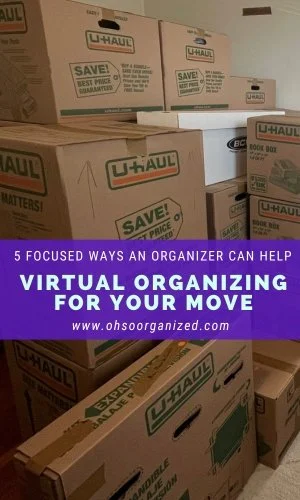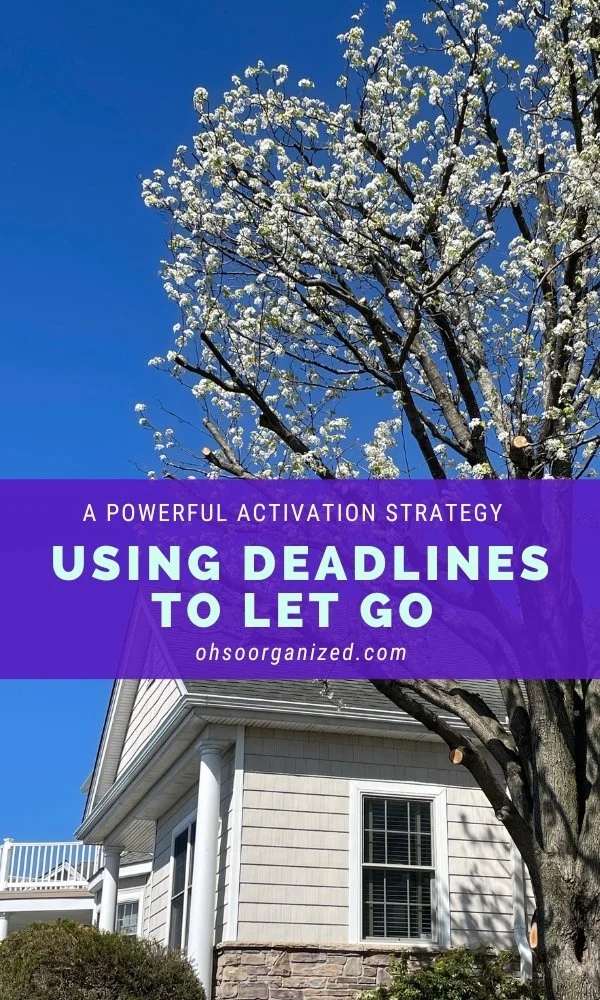In the northeast, the leaves are changing, and it’s a season of transition. Is fall the unofficial moving season? It seems so, especially since many of my clients and kiddos are in the process of moving, downsizing, right-sizing, or transitioning.
Moving involves many decisions and plans, which can be overwhelming. The good news is you don’t have to do it alone. Reduce your stress and enjoy the benefits of getting help from a virtual professional organizer like me.
Depending on your stage in the moving process, motivation can vary significantly. For example, if you're moving within a month because your lease is ending or your house was just sold, the limited time creates pressure that boosts motivation. However, if you're planning to move years from now or moved several years ago but haven't fully unpacked or settled, your motivation might feel important but less urgent.
No matter what stage of moving you’re in—pre-move, during, or post-move—having the right support makes an enormous difference. Whether you hire a professional organizer or ask family and friends for help, creating your team will help things go more smoothly and reduce stress.
Because you know what they say—moving is one of the top ten most stressful things we do in life.
In a 2020 survey by OnePoll for North American Van Lines, 64% of respondents said that their recent move was one of the most stressful experiences they ever had.
In a 2022 Move.org survey, 38% of respondents said moving was more stressful than parting with a significant other.
In a 2025 survey by HireAHelper, 29% of participants said they’d rather get a divorce than move again. 55% of participants rated moving as highly stressful.
5 Ways a Virtual Professional Organizer Helps You Navigate a Move
1. Clarify Your Why
Your reasons for moving might seem obvious. However, an organizer can help you clarify these reasons and keep them relevant as you make decisions. There are many choices to consider, and decision fatigue can set in. Keeping your ‘why’ visible helps you stay focused, encourages the right actions, and boosts your motivation.
Maybe your why is to:
Simplify life—own less, manage less, and reduce your financial obligations.
Consider the future—downsize and organize your belongings now so your family won’t have the burden of doing it after you’re gone.
Get more space—Your current living situation is too cramped, and you need extra room for your growing family.
Relocate temporarily—A family or work situation requires you to move, even if it’s not an ideal scenario.
Reimagine life—You’ve experienced a major life change, like losing a loved one, starting a new job, becoming an empty nester, or retiring. Now you want a fresh start in a new place.
2. Establish Timeline and Pace
As an organizer, I enter someone’s life at a particular moment in time. Sometimes, I’m contacted well in advance of a move, giving enough time to plan and edit. Other times, I engaged right before or after a move. Every scenario requires a different timeline to help someone go from where they are to where they want to be.
Working together, we can create a schedule, even a loose one, to put a reality check on what’s possible to accomplish within a certain timeframe. Many considerations will affect your timing, including:
Budget
Urgency
Time available to focus on the project
Life demands more than just moving
Support team you have or need to assemble
Pacing is just as essential as understanding the overall timeline. If you're years away from moving, you can proceed at a slower, steady pace. However, if you're moving this month, the pace needs to be much faster. You might need extra help to finish your move.
3. Edit and Organize Your Stuff
Even if you don’t see yourself as a ‘collector,’ you probably have plenty of things to edit before and even after your move. You know how it goes, right? As humans, we accumulate a lot of stuff. And if you’ve been in your home for a long time, you likely have even more stuff.
Enlisting help from a virtual professional organizer during the editing phase is invaluable. I can support that process in various ways, including:
Weighing your options
Providing focus as you sort through your things
Establishing decision-making parameters
Sharing letting go strategies
Helping determine which category something belongs to: Keep, Toss, Donate, Sell, Route to storage, or Give to a specific person
While it’s best to edit your belongings before moving, that’s not always possible. Letting go often continues after the move, even if you edited beforehand. If you’ve already moved, I can help you with ongoing editing, decluttering, refining, space planning, organizing, and deciding about the last 10% of items that haven’t been unpacked.
“Even if you don’t see yourself as a ‘collector,’ you probably have plenty of things to edit before and even after your move.”
4. Have Access to Trusted Resources
Throughout every stage of a move, you’ll need various resources for donating, selling, recycling, or disposing of items. You might also need referrals for vendors like movers, junk haulers, or suggestions for organizing products.
With over 30 years in the organizing industry, I’ve gathered hundreds of resources to share with my clients. I also have a network of industry colleagues who generously share their resources whenever I need a referral for something or someone I don’t already have.
5. Collaborate with a Thought Partner
Moving can feel like a huge jumble of puzzle pieces. Although the pieces will eventually fit together to create a new, beautiful picture, it currently feels chaotic and overwhelming. Moves and related tasks can be emotionally draining.
However, working with a thought partner helps you make sense of those pieces more quickly and feel supported throughout the process.
A thought partner can help you:
Get unstuck
Reduce overwhelm
Identify your next step
Brainstorm solutions to obstacles
Develop checklists
Encourage action
Discuss your choices and options
Provide accountability
Boost motivation
Can You Benefit from Virtual Organizing Help?
While physical tasks like packing and unpacking are not things I assist with as a virtual professional organizer, there are many other areas, as discussed, that I can help with.
Location isn’t a barrier. Virtual organizing lets me work globally. Even though I’m based in New York, I can help whether you’re in California, Canada, or somewhere else.
Virtual organizing sessions are focused and short, lasting 60 to 90 minutes each. We’ll work together on your goals, then you’ll have time afterward to work independently, with ongoing support to repeat that process.
Are you moving right now? If so, how can you benefit from enlisting help from a virtual professional organizer?
I’d love to hear your thoughts. I invite you to join the conversation.
How Can I Help?
Do you feel overwhelmed, stuck, or disorganized? I’m here to help! Virtual organizing is an extraordinary path forward – Local feel with a global reach.
Let’s talk. I’m easy to reach.
Fill out the Contact form
Email me at linda@ohsorganized.com or
Call 914-271-5673
Getting organized is possible, especially with support.


















